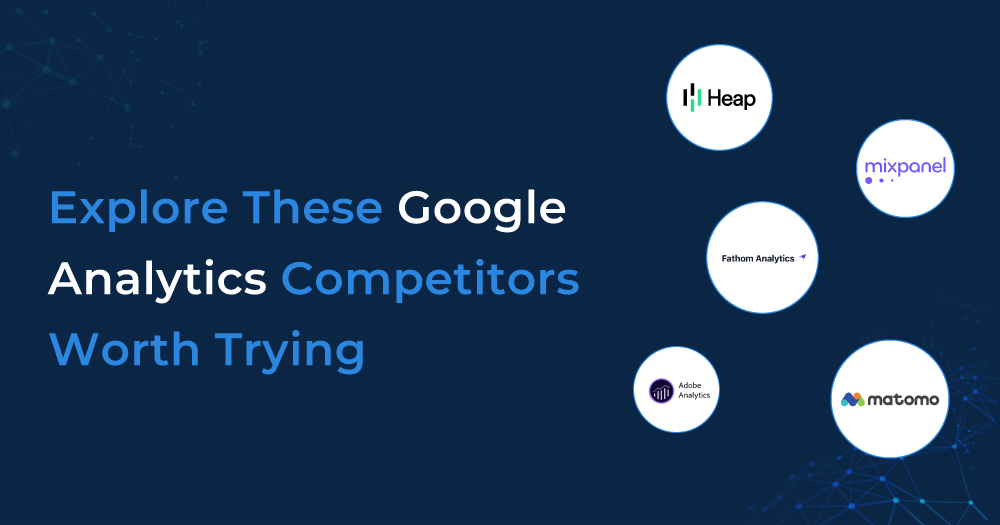Google Analytics has long been the go-to platform for tracking website traffic and gaining insights into user behavior. However, as businesses evolve, many are seeking alternatives that provide more specific features, enhanced privacy, or simpler interfaces. Whether you’re concerned about data privacy, looking for easier-to-understand metrics, or just exploring new options, there are several excellent Google Analytics competitors worth considering. Below, we explore six of the best alternatives that are gaining popularity.
1. Matomo
Why Matomo?
Formerly known as Piwik, Matomo is one of the most popular open-source alternatives to Google Analytics. The platform is well-suited for businesses that prioritize data privacy. Unlike Google Analytics, Matomo gives you full control over your data, allowing you to host it on your own servers. It’s a feature-rich platform with a user-friendly interface, offering real-time analytics, goal tracking, and e-commerce reporting. Another advantage is that it complies with the strictest privacy laws like GDPR, making it a safe option for businesses operating in regions with stringent data regulations.
Key Features:
- Self-hosting options for complete data ownership
- GDPR and CCPA compliance
- Real-time analytics and reporting
2. Mixpanel
Why Mixpanel?
Mixpanel takes a different approach to analytics by focusing on user behavior rather than just page views. It’s especially valuable for businesses that want to dive deeper into how users interact with their website or app. Mixpanel allows you to track events like button clicks, form submissions, and other interactions in a highly customizable manner. This makes it a favorite among SaaS companies and mobile app developers who want detailed insights into user journeys and funnels.
Key Features:
- Advanced event tracking and user behavior analysis
- Customizable dashboards for different team needs
- User retention and funnel analysis tools
3. Fathom Analytics
Why Fathom Analytics?
If privacy is a key concern for your business, Fathom Analytics might be the perfect choice. This privacy-first platform doesn’t track individual user data, meaning you can avoid many of the regulatory hurdles tied to data privacy laws. Its minimalist interface is easy to navigate, providing the essential data you need without the clutter. Fathom is also known for its fast-loading times, thanks to its lightweight tracking code that won’t slow down your website.
Key Features:
- Privacy-focused with no personal data collection
- Simple and clean user interface
- Fast and lightweight tracking
4. Adobe Analytics
Why Adobe Analytics?
Adobe Analytics is a powerful, enterprise-grade tool designed for larger businesses and organizations. It offers more in-depth customization and scalability than Google Analytics, making it a robust option for companies with complex data needs. Adobe Analytics excels in multichannel attribution and customer journey mapping, making it easier to understand how different marketing efforts contribute to conversions. The platform also integrates seamlessly with other Adobe products, providing a comprehensive marketing solution.
Key Features:
- Advanced segmentation and customer journey mapping
- Multichannel data integration and reporting
- Seamless integration with Adobe’s marketing suite
5. Heap Analytics
Why Heap Analytics?
Heap stands out for its automatic event tracking, a feature that sets it apart from many analytics tools. Instead of manually setting up tracking for specific actions like form submissions or button clicks, Heap tracks everything automatically. This allows businesses to gather a wealth of data without having to spend time configuring their analytics setup. Heap’s visualizations and user interface are also highly intuitive, making it a strong choice for marketers who want quick insights into user behavior without the technical overhead.
Key Features:
- Automatic event tracking for faster data collection
- Easy-to-use interface and dashboards
- Instant insights without manual configuration
6. Clicky
Why Clicky?
Clicky is another real-time analytics platform that offers a simpler alternative to Google Analytics. What sets Clicky apart is its live dashboard, which allows you to see who is on your site in real time and track individual visitors. Clicky also offers a heatmap feature, enabling you to see where users are clicking on your pages. It’s an excellent option for smaller businesses or those who need more actionable, real-time data.
Key Features:
- Real-time visitor tracking and individual user insights
- Built-in heatmaps for visual user behavior analysis
- Simple interface that’s easy to navigate
Conclusion
While Google Analytics remains a powerful tool, exploring alternatives can open up new opportunities for gaining insights tailored to your specific needs. Whether you’re prioritizing data privacy with platforms like Matomo and Fathom, seeking advanced user behavior tracking with Mixpanel and Heap, or looking for real-time analysis with Clicky, there’s a wealth of options available. Each of these tools brings something unique to the table, making them worth considering as part of your analytics strategy.
Ultimately, the best Google Analytics competitor for you will depend on your business goals, data privacy needs, and the specific features you value most in an analytics platform.
